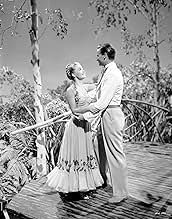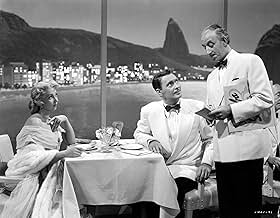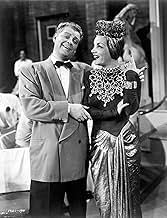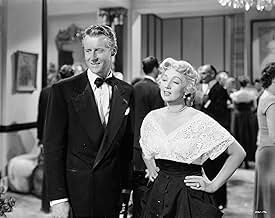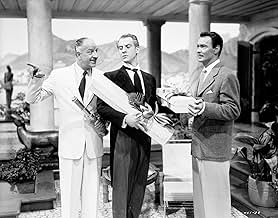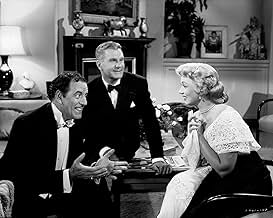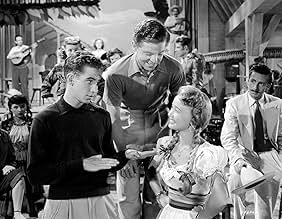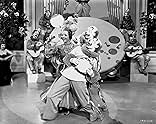AVALIAÇÃO DA IMDb
6,4/10
664
SUA AVALIAÇÃO
Adicionar um enredo no seu idiomaA mother and daughter compete over the same singing role and, unbeknownst to each other, the same man.A mother and daughter compete over the same singing role and, unbeknownst to each other, the same man.A mother and daughter compete over the same singing role and, unbeknownst to each other, the same man.
- Direção
- Roteiristas
- Artistas
Jean Andren
- Party Guest
- (não creditado)
Carlos Barbe
- South American Man
- (não creditado)
Leon Belasco
- Professor Gama
- (não creditado)
Nita Bieber
- Specialty Dancer
- (não creditado)
Irene Booth
- Party Guest
- (não creditado)
Avaliações em destaque
Sidney Sheldon wrote the screenplay based on an earlier film that starred Deanna Durbin, but this time tedium sets in rather early. In short, it's an uninspired remake designed to bring bubbly JANE POWELL, ANN SOTHERN, CARMEN MIRANDA, BARRY SULLIVAN and LOUIS CALHERN together for what is supposed to be a light-hearted romp.
For a musical, there is too long a gap between dialog and songs and none of the songs are especially memorable. The sets are opulent, the costumes are tastefully designed with no expense spared on wardrobe, and the color is splendid. But the story is the one about a mother and daughter actress team who are both in love with the same man, unknown to each other, until the plot complications are straightened out.
Whatever sparkle there was to the original B&W film has been dampened by a dull script, slow-paced direction and some coy performances from Sothern and Powell. Powell postures as a would-be actress but her artificial poses are contrived and obvious which makes Sullivan suspecting that she's a girl "in trouble" (when she's really rehearsing a part) seem a strain on credibility.
Both Sothern and Powell are given the usual MGM glossy close-up treatment, but the silly plot defeats everyone.
Rio is strictly a fabrication on an MGM sound stage. Only CARMEN MIRANDA's lively musical contributions make watching this worthwhile. That, and a nice, understated, low-key performance from the always reliable BARRY SULLIVAN saves the comic moments from being downright foolish.
For a musical, there is too long a gap between dialog and songs and none of the songs are especially memorable. The sets are opulent, the costumes are tastefully designed with no expense spared on wardrobe, and the color is splendid. But the story is the one about a mother and daughter actress team who are both in love with the same man, unknown to each other, until the plot complications are straightened out.
Whatever sparkle there was to the original B&W film has been dampened by a dull script, slow-paced direction and some coy performances from Sothern and Powell. Powell postures as a would-be actress but her artificial poses are contrived and obvious which makes Sullivan suspecting that she's a girl "in trouble" (when she's really rehearsing a part) seem a strain on credibility.
Both Sothern and Powell are given the usual MGM glossy close-up treatment, but the silly plot defeats everyone.
Rio is strictly a fabrication on an MGM sound stage. Only CARMEN MIRANDA's lively musical contributions make watching this worthwhile. That, and a nice, understated, low-key performance from the always reliable BARRY SULLIVAN saves the comic moments from being downright foolish.
For practically the whole of Ann Southern's career she was predestined to be considered a competent, reasonably popular actress. In fact, she was considerably more than that and this film, until much later in her career, is the proof. The plot about an actress Mother (Southern) and her singing daughter (Powell) is two steps above hokey but the realization gives it status and sturdy performances in support carry the day. A subplot that has everything thinking the daughter might be with child was semi-shocking for the time but, today, might make one wonder what the fuss was about. The completely artificial looking sets-Rio as painted on a scrim-leave no doubt that this was filmed on the back lot.(And that illusion isn't helped by some included footage actually shot in Rio during Carnival.) But the singing and dancing are fun to watch, Jane Powell is in particularly good voice, and the thin plot just carries the day. But only just. Need I mention the happy ending? Did you think otherwise? So join Ann and the cast for a spurious adventure in Rio and remind yourself what good actors can do with very modest material.
As a fan of musicals and who gets great enjoyment out of seeing Jane Powell and Carmen Miranda, 'Nancy Goes to Rio' didn't disappoint at all, actually getting more or less what was expected.
Only the story in 'Nancy Goes to Rio' isn't so good. It does go overboard on the silliness and is both thin and too busy at times, with narrative surprises next to none. The ending is also rather abrupt and strange and the romance is bland somewhat and feels like an afterthought.
However, as to be expected, 'Nancy Goes to Rio' is a glorious-looking film. The sets and costumes are suitably opulent and complemented beautifully by the radiant cinematography and the big, bold and rich colours.
The music is always a pleasant listen and infectiously upbeat. "Magic is the Moonlight" and especially "Shine on Harvest Moon" stand out, as does Carmen Miranda's colourful and to-be-seen-to-be-believed second production number. Nice use of "Quando M'En Vo" too from Puccini's 'La Boheme'. The choreography is cleverly done, especially in Miranda's second production number.
Furthermore the script is filled with snappy lines that crackle in energy and wit, the whole film is breezily directed and the whole film is just full of fun and charm, just perfect for 100 minutes escapist entertainment.
Jane Powell is her usual pert and charming self and is in wonderful voice. Ann Southern more than matches her as her mother. Meanwhile Carmen Miranda is a riot in material that shows off her talent splendidly, Louis Culhern is sparkling comedic support and Barry Sullivan is effectively subdued without being bland.
On the whole, a Technicolor and musical treat, as long as you don't demand too much. 8/10 Bethany Cox
Only the story in 'Nancy Goes to Rio' isn't so good. It does go overboard on the silliness and is both thin and too busy at times, with narrative surprises next to none. The ending is also rather abrupt and strange and the romance is bland somewhat and feels like an afterthought.
However, as to be expected, 'Nancy Goes to Rio' is a glorious-looking film. The sets and costumes are suitably opulent and complemented beautifully by the radiant cinematography and the big, bold and rich colours.
The music is always a pleasant listen and infectiously upbeat. "Magic is the Moonlight" and especially "Shine on Harvest Moon" stand out, as does Carmen Miranda's colourful and to-be-seen-to-be-believed second production number. Nice use of "Quando M'En Vo" too from Puccini's 'La Boheme'. The choreography is cleverly done, especially in Miranda's second production number.
Furthermore the script is filled with snappy lines that crackle in energy and wit, the whole film is breezily directed and the whole film is just full of fun and charm, just perfect for 100 minutes escapist entertainment.
Jane Powell is her usual pert and charming self and is in wonderful voice. Ann Southern more than matches her as her mother. Meanwhile Carmen Miranda is a riot in material that shows off her talent splendidly, Louis Culhern is sparkling comedic support and Barry Sullivan is effectively subdued without being bland.
On the whole, a Technicolor and musical treat, as long as you don't demand too much. 8/10 Bethany Cox
A so-so musical comedy, chipper and competently shot on the studio back lot far, far away from Rio. If there's any reason to watch this corny confection, it would be for the show-stopping number by Carmen Miranda in the nightclub. The hues alone are incredible! Everything is dripping in rich, over-saturated color - the costumes, the set - it's like an explosion at the Technicolor factory. The production designer and director were surely using the process to "wow" the audience used to common, flatter black and white films for so long, similar to the 3D process that would come along later. Inside this gem of a scene is Miranda's dance performance, which is really energetic and quite imaginative. If you ever wanted to test your TV screen color and balance, this scene from this piece of 50s flash might be the one to do that with. The rest of the film? Meh... hokum, but quaint.
Frances Elliott (Ann Sothern) is an established stage star and her daughter, Nancy (Jane Powell) is an aspiring actress. However, some potential hurt feelings might be in store for them, as Frances assumes that the lead in an upcoming play will be hers...but the producer and author see someone much younger....and want Nancy instead. Could this get any worse? Well, later it appears that they are vying for the same man (Barry Sullivan)!
Despite the plot sounding a bit scandalous, it really isn't. In fact, it's just a nice old fashioned musical and makes for decent viewing. Far from a must see but enjoyable. My only reservation is for someone who has a fear of clowns...they should NOT watch the picture as some mega-creepy clowns do a song and dance number with Carmen Miranda near the end...and it will most likely unnerve you.
Despite the plot sounding a bit scandalous, it really isn't. In fact, it's just a nice old fashioned musical and makes for decent viewing. Far from a must see but enjoyable. My only reservation is for someone who has a fear of clowns...they should NOT watch the picture as some mega-creepy clowns do a song and dance number with Carmen Miranda near the end...and it will most likely unnerve you.
Você sabia?
- CuriosidadesThis is a remake of the Deanna Durbin film Rival Sublime (1940). Both films were produced by Joe Pasternak, and in both the young star --- Jane Powell in this version --- sings "Musetta's Waltz" from Giacomo Puccini's opera "La Boheme."
- Erros de gravaçãoAt dinner Nancy is advised to take calcium to prevent scurvy. Scurvy is caused by a Vitamin C deficiency, not a calcium deficiency, and takes 2-3 months to develop.
- Citações
Paul Berten: He double-crossed me, hit me when I was looking.
- Cenas durante ou pós-créditosMiss Miranda accompanied by Bando da Lua
- Versões alternativasA whole musical number, "Mention My Name In Sheboygan," performed by Jane Powell and Scotty Beckett, was ultimately cut from the final film. Clips of this scene are still in existence.
- ConexõesFeatured in Era Uma Vez Em Hollywood, Parte III (1994)
- Trilhas sonorasTime and Time Again
Written by Fred Spielman and Earl K. Brent
Performed by Ann Sothern (uncredited) and Danny Scholl (uncredited)
Principais escolhas
Faça login para avaliar e ver a lista de recomendações personalizadas
Detalhes
- Data de lançamento
- País de origem
- Idiomas
- Também conhecido como
- Pasión carioca
- Locações de filme
- Empresa de produção
- Consulte mais créditos da empresa na IMDbPro
- Tempo de duração
- 1 h 40 min(100 min)
- Proporção
- 1.37 : 1
Contribua para esta página
Sugerir uma alteração ou adicionar conteúdo ausente


